About Us
Home > About us
About Us
Our Vision
“To create an environment where seafarers, their families and others may freely have the opportunity to hear the word of God.”
Our Mission
“To actively encourage and minister in every possible way to the spiritual, physical, practical and mental welfare of seafarers, their families and port workers and to provide counsel in the cause of the Christian faith and well-being.“



About Us
Our Objectives
SCFS provides a service to seafarers with compassion – service with compassion is our call, our commission and our goal.

To Employ
Ordained, Associate and Volunteer Port Chaplains and Ship Visitors for the visitation of ships in various ports worldwide

To Seek
to befriend and support seafarers, their families and others.

To Offer
spiritual, physical, and mental welfare support as necessary.

To provide
practical support through the provision of appropriate clothing, personal hygiene products and food and transport as requested.

To disseminate
the Holy Scriptures, tracts, and Christian literature among the seafarers and others.

To conduct
Christian services on board vessels as requested.

To Disciple
and encourage seafaring Christians in the continuation of their faith.

To Promote
SCFS Worldwide
About Us
Our Heritage
The Seamen’s Christian Friend Society (SCFS), as it was first named, has been offering the hand of friendship to the seafaring community and to all those involved in maritime industries, trades and activities since 1846. The story of how our Society came about, and how it has been sustained for nearly 180 years, is one of courage, endeavour and God’s faithfulness.
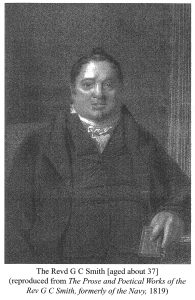 The foundation of the Society owes much to Rev George Charles Smith, more commonly known as ‘Bo'sun Smith’, who was born in London in 1782. At the age of only 14, he was press-ganged into the Royal Navy and served under Nelson at the battle of Copenhagen in 1801. However after leaving the Navy, Smith’s life was turned around in 1803, while attending a chapel in Reading, and by his own account “the divine process of conversion began on my birthday, March 19th 1803.” He was 21 years old.
The foundation of the Society owes much to Rev George Charles Smith, more commonly known as ‘Bo'sun Smith’, who was born in London in 1782. At the age of only 14, he was press-ganged into the Royal Navy and served under Nelson at the battle of Copenhagen in 1801. However after leaving the Navy, Smith’s life was turned around in 1803, while attending a chapel in Reading, and by his own account “the divine process of conversion began on my birthday, March 19th 1803.” He was 21 years old.
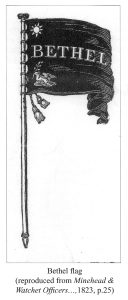 Smith was a man of tremendous devotion and energy whose driving influence was his love of the Lord Jesus Christ and his deep concern for the spiritual welfare of seamen. His life's work among them began when he became minister of a Baptist chapel in Penzance. He started corresponding with seafarers all over the world and through this letter writing he was able to keep in touch with hundreds of sailors and their families and help them in a great many ways.
Smith was a man of tremendous devotion and energy whose driving influence was his love of the Lord Jesus Christ and his deep concern for the spiritual welfare of seamen. His life's work among them began when he became minister of a Baptist chapel in Penzance. He started corresponding with seafarers all over the world and through this letter writing he was able to keep in touch with hundreds of sailors and their families and help them in a great many ways.
A founder of the Bethel Union, he began to use a ‘Bethel Flag’ hoisted on ships to advertise that he was to preach or conduct a prayer meeting and in 1820 he formed a floating chapel and Seaman’s Friend Society in Bristol. Other floating chapels followed in Liverpool and Hull.
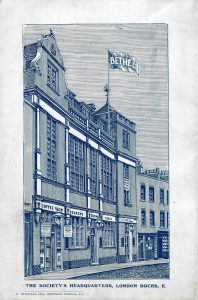 Smith’s interest focused increasingly on London and in 1819 he opened a floating chapel for sailors on the River Thames. He was prodigious in founding organisations to tackle the social needs of his day, amongst them the Thames Waterman's Friend Society, the Merchant Seamen's Orphan Asylum for Boys, the Maritime Penitent Female Refuge and the Shipwrecked and Destitute Sailors Asylum.
Smith’s interest focused increasingly on London and in 1819 he opened a floating chapel for sailors on the River Thames. He was prodigious in founding organisations to tackle the social needs of his day, amongst them the Thames Waterman's Friend Society, the Merchant Seamen's Orphan Asylum for Boys, the Maritime Penitent Female Refuge and the Shipwrecked and Destitute Sailors Asylum.
Smith moved to London in 1825 and remained there until 1848. In 1824 he founded the Mariners' Church in Wellclose Square and became its minister a year later. The Mariners’ Church is believed to have been the first land-based church especially for sailors and their families and it was here that the Seamen's Christian Friend Society began to take shape.
In 1845 financial pressures caused the Church to close and Bo’sun Smith withdrew from the work, but the Society that he had founded pressed on and continued its work in a disused sugar warehouse in the Ratcliff Highway. SCFS maintained its presence in the east end of London well into the twentieth century, with its headquarters in St George Street opposite the old London dock wall.
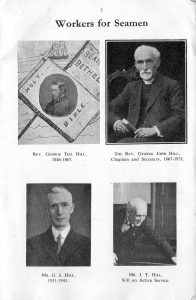 It’s at this point that Rev George T Hill (b.1818) enters the picture. He had been a tailor who came to faith after attending a revival meeting and then trained in Glasgow for the ministry. After finishing his training, he took his family to live in London, where he met Bo'sun Smith and worked with him among seafarers for nine years.
It’s at this point that Rev George T Hill (b.1818) enters the picture. He had been a tailor who came to faith after attending a revival meeting and then trained in Glasgow for the ministry. After finishing his training, he took his family to live in London, where he met Bo'sun Smith and worked with him among seafarers for nine years.
When the Mariners' Church closed in 1845, Rev George Hill became the first leader of a new body called the Seamen's and Soldiers' Evangelical Friend Society. The minute book for the Society contains a record of their first meeting held on 14th January 1846. Two years later, on 20th June 1848, the name was changed to the Seamen's Christian Friend Society, better known simply as SCFS.
George Hill remained as the secretary of the Society for many years and was succeeded in that position by his son, George John Hill, who held the office for sixty-two years until his own death in 1931. He, in turn, was succeeded by his son, John, who held the post until he died in September 1941. Thus three generations of the same family guided the Society almost to its centenary year.
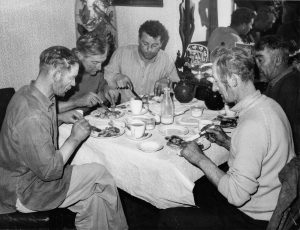 The second half of the nineteenth century saw many more port mission stations being established. Ports on the coast of Cumberland, Lancashire, Cornwall and Devon were included, as well as Ramsey on the Isle of Man and Galway in Ireland. A Scottish work also began in Ayrshire. As well as port missionaries, a range of facilities was provided including sailors’ rest homes, institutes and Bethels, which offered food and accommodation.
The second half of the nineteenth century saw many more port mission stations being established. Ports on the coast of Cumberland, Lancashire, Cornwall and Devon were included, as well as Ramsey on the Isle of Man and Galway in Ireland. A Scottish work also began in Ayrshire. As well as port missionaries, a range of facilities was provided including sailors’ rest homes, institutes and Bethels, which offered food and accommodation.
The First World War brought unprecedented demand for welfare services and spiritual support. It is estimated that approximately 15,000 merchant seamen working on British and Empire vessels lost their lives between 1914 and 1918 and many more required care and support.
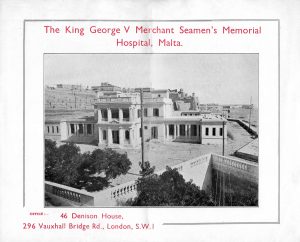 As part of this response to the war, the Society took on responsibility in 1922 for the King George V Seamen's Memorial Hospital in Malta. The hospital was intended chiefly to serve the needs of merchant seamen, but it also cared for Royal Navy personnel and their families, as well as residents and visitors to the island. During the Second World War the hospital was destroyed by enemy action in April 1942. It was subsequently rebuilt and reopened in 1948.
As part of this response to the war, the Society took on responsibility in 1922 for the King George V Seamen's Memorial Hospital in Malta. The hospital was intended chiefly to serve the needs of merchant seamen, but it also cared for Royal Navy personnel and their families, as well as residents and visitors to the island. During the Second World War the hospital was destroyed by enemy action in April 1942. It was subsequently rebuilt and reopened in 1948.
The King George V Seamen's Memorial Hospital maintained a strong Christian witness and many seamen who came into its wards heard the gospel preached. However, when Malta gained independence in 1964 and the Royal Navy left, the hospital placed a major strain on the Society’s finances and it finally closed in 1967.
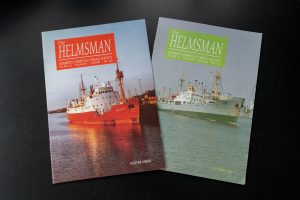 In 1946 the Society celebrated its centenary. At the front of the annual report for that year was a picture of the Society’s patron, King George VI, and a quotation from his June 1944 call to prayer, which included the line “We shall ask not that God may do our will, but that we may be enabled to do the will of God.” A sentiment that the Society still holds as we move closer to our bicentenary.
In 1946 the Society celebrated its centenary. At the front of the annual report for that year was a picture of the Society’s patron, King George VI, and a quotation from his June 1944 call to prayer, which included the line “We shall ask not that God may do our will, but that we may be enabled to do the will of God.” A sentiment that the Society still holds as we move closer to our bicentenary.
In the years after the Second World War the work ebbed and flowed with some ports closing and others opening to new missionaries. In 1989 the SCFS assumed responsibility for the work previously undertaken by the Merchant Navy Christian Fellowship and in 1990 the Christmas edition of the ‘Helmsman’ magazine contained reports from Belfast, Cork, Dublin, Dundee, Greenock, Hull, Grimsby, Liverpool, Portsmouth, Southampton, Teeside and Tilsbury. Overseas reports from Hamburg and Antwerp were also included.
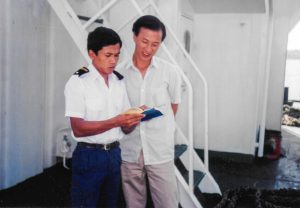 Today, the Society has Port Chaplains and volunteers around the UK, Ireland, Europe, Australia, the Philippines and St. Lucia. Often this work is done through affiliated organisations that share our objectives and beliefs. The Society seeks to maintain good working relationships with all those working for the welfare of seafarers, port workers and their families.
Today, the Society has Port Chaplains and volunteers around the UK, Ireland, Europe, Australia, the Philippines and St. Lucia. Often this work is done through affiliated organisations that share our objectives and beliefs. The Society seeks to maintain good working relationships with all those working for the welfare of seafarers, port workers and their families.
Shipping and technology have changed almost beyond recognition since Bo’sun Smith first hoisted a Bethel flag to conduct a prayer meeting aboard ship. However, his passion for the Gospel and the welfare of seafarers and their families is what continues to motivate all who work for SCFS. As we seek to meet the challenges of the twenty-first century we will explore new opportunities to expand into more ports and work in close co-operation with affiliated organisations.
About Us
Our team
SCFS provides a service to seafarers with compassion – service with compassion is our call, our commission and our goal.

Colin Dickenson
Executive Director
- Email:colin.dickenson@scfs.org

Claire Kyle
Finance & Administration Officer
- Phone:+44 (0)2895217770
- Email:hq@scfs.org

Tom Henderson
Finance Manager (part time)

Tom Henderson
Finance Manager (part time)
About Us
Our Board
SCFS provides a service to seafarers with compassion – service with compassion is our call, our commission and our goal.

Steven Thompson
Trustee and Chair

Steven Thompson
Trustee and Chair

Archie McAvoy
Trustee and Treasurer

Archie McAvoy
Trustee and Treasurer

Andrew Dakin
Trustee

Charles Hancock
Trustee

Charles Hancock
Trustee

Hermie Santos
Trustee

Hermie Santos
Trustee

Danny Yarker
Trustee and Secretary

Danny Yarker
Trustee and Secretary
About Us
Our ambassadors
SCFS provides a service to seafarers with compassion – service with compassion is our call, our commission and our goal.

Mervyn Jeffers
Ambassador

Mervyn Jeffers
Ambassador

Martin Otto
Ambassador

Martin Otto
Ambassador

Volker Lamaack
Ambassador

Volker Lamaack
Ambassador

Dave Robertson
Ambassador

Dave Robertson
Ambassador

Peter Wells
Ambassador

Peter Wells
Ambassador

